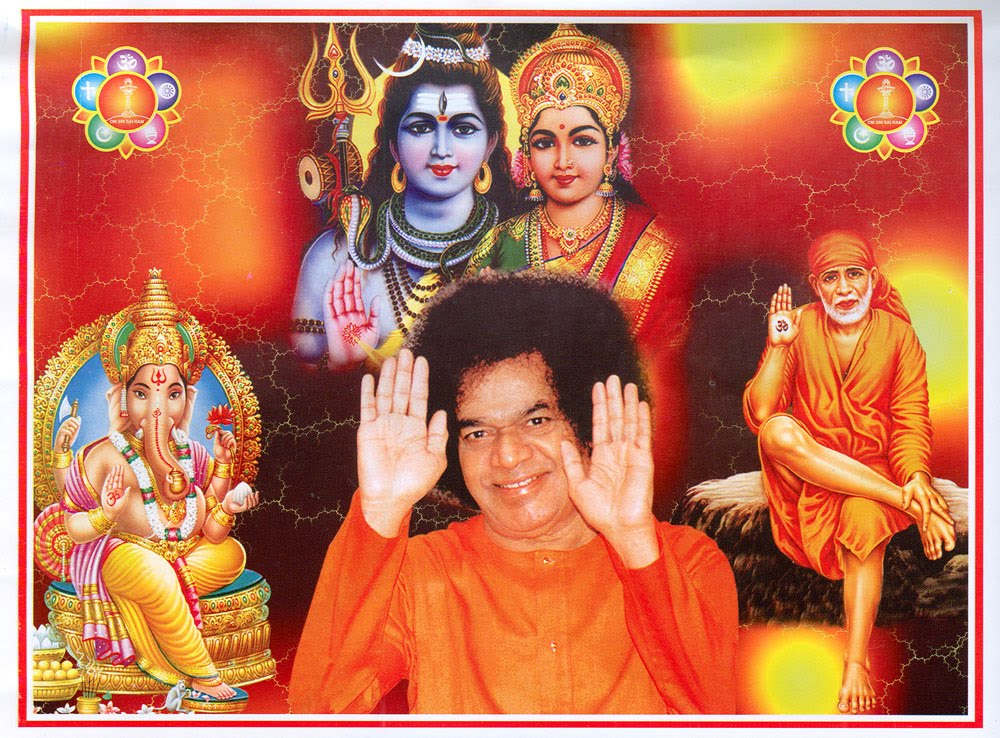Day 3 (evening) proceedings of Athi Rudra Maha Yagna, Navarathri Homa and Durga Pooja
Thursday, October 15, Evening: The session commenced with the arrival of Bhagawan at 5pm to the majestic dias in the Yagna Shaala, richly decorated with a beautiful floral Shiva Lingam in the backdrop. After 20 minutes of soul-stirring bhajans, Swami indicated for the programmes to begin with the Veda chanting. It was the turn of the students from the Alike campus and Bhagawan was very impressed with their recital. During His last visit to Alike, He had heard them chant, and had invited them to come and chant here at Muddenahalli.
Students from Alike campus chanting the Vedas
After blessing all the Veda students with Padanamaskar and Vibuthi prasadam, it was the turn of Brother Badri Narayanan, an alumnus from the Sri Sathya Sai Institute of Higher Learning, Prasanthi Nilayam campus, to share his insights about the Bhagawatham. He has been enthralling the audience for the last couple of days with his impeccable knowledge of the Bhagawatham, in the most unassuming and captivating style!
Brother Badri spoke about Dhruva and pointed out the subtle difference between Dhruva and Prahalada. Dhruva went with a desire to Narayana, a boon to be seated on his father Uttanapada's lap, however Prahalada was desireless. The highest of the devotee of the four kinds is the one who prays to God, only for God's sake. Brother Badri was running high fever, yet he made it to the program. Swami blessed him with a gift and told him that this is the right way. Despite illness Swami never stopped giving Darshan and blessing devotees because the body is meant only for service to the others – "Paropakaram Idam Sariram".
Sri Badri Narayanan expounding on the devotion of Dhruva
After Bhagawatha parayana, band students from all campuses of Swami including two alumni sisters from Anantapur, joined the students of Muddenehalli to render a few pieces at the Lotus Feet of Bhagawan. The group is aptly called 'Sai's Angels', as they spread good tidings through their soulful instruments. Students were provided with the musical instruments exactly a year ago, on the same day. They were novices then, but today they were successful in impressing Swami with a flawless rendition!
Bhajans like Om Namaha Shivaya, Ganga Jatadhara and Manasa bhajare were beautifully set to the western notes and chords. Brass explosion was another piece that was played. Swami was very happy that the students had picked up the various tunes from scratch, within a year and were able to play so well! He asked them to re-play the Manasa Bhajare tune. A few senior band students rendered the bhajan, Hari Bhajana Bina Sukha Shanti Nahi. Bhagawan blessed all with gifts and namaskar, and granted them a group photo as well.
Sai Angels Brass Band performing in the Divine Presence
A talk by Sri Muralidhar Bhat, a priest from the Hari Hara Matt of Sringeri, was next on the agenda. He spoke about the significance of homas and the various rituals during the holy period of Navarathi.
Sri Muralidhar Bhat addressing the gathering
Bhagawan delivered His divine discourse thereafter.
Summary of Divine Discourse:
'Yogakshema' or welfare does not mean that God gives us all wealth and treasures which are only worldly. Real 'Yogakshema' means that "I will drive away the darkness of ignorance from my devotee, grant him the experience of the divine self, granting him divine bliss." When you have God right in front of you who will grant you both 'Bhakthi' and 'Mukthi' – devotion and liberation – why do you go after worldly pleasures and experiences?
Man goes in search of joy and bliss to many places. Being the embodiment of bliss himself, he looks for joy and bliss elsewhere. Despite studying all the scriptures and possessing that knowledge, why are we unable to find bliss? There are three obstacles – 'mala', 'vikshepa', 'aavarana'.
'Mala' means impurities. Selfish desires are the impurities within us. We are enveloped in body consciousness and are always thinking of 'I' and 'mine'. If you want to look at your reflection in the mirror, you have to remove the dust on it. This is because the dust of impurities disables you to see your reflection and so you are looking for it in other places. The second is 'vikshepa', or the darkness of ignorance. Because of the darkness, you don't see what really exists; you think something exists which is not really there. When you light the lamp of wisdom in your heart, you can see what is temporary and what is permanent. Wisdom is seeing the unity of all creation. When you put on the light of wisdom in the room you can see your reflection in the mirror. You have removed the dust on the mirror and put on the light but are still unable to see your reflection because of the cover on the mirror. When you remove the cover you can see your own reflection. Ego is that impurity, attachment is the darkness.When we get rid of body consciousness by removing ego and attachments, we can know our own Truth.
When you are young and when your head, heart and hands are strong, you have to utilise time well, get into satsangs, learn good things. Food, sleep, procreation and fear are common to both animals and men. Only wisdom separates human beings and animals. When you realise the atma principle, knowing that everything else is transient and temporary, only then can you enjoy true bliss in your lives. It is a mistake to think that I am serving somebody else. The right thing is to consider is that I am serving God who is in every body; I am serving God who is in me. It is only a duty, not a service. We are doing service in order to get rid of ego and attachment within us.
Many people would ask Swami, "When you are having such high fever, why do you come and grant darshan?" I had only one answer for them, "This body has come for removing the ills of mankind. The body is the basis of all good activity. This body is given for helping others. Using the body for any other activity other than helping others is not right.
The body has five sheaths – food sheath, life, mind, intelligence and bliss. Only when life gets into this, the inert becomes full of life. But at death, life leaves the inert body and goes away. At death you have lost only the gross body but not the mind. The subtle body still has the life, mind and intelligence principle. The subtle body even has ego and attachment. Only when you get another physical body, you can look for liberation. In order to cross over this ocean of samsara, you need this body. . You can live in samsara but samsara should not get into you. You will be happy and secure as long as this worldliness does not get into your mind.
When you want to offer something to Shiva and Parvathi who are in subtle form, you also have to convert the material into subtle form. The fire of hunger in our stomach digests food and takes the subtle strength from the food. Similarly when you offer gross objects into the fire in the homa kunda, it transforms it into their subtle form and sends it to the subtle forms of God. When you offer everything with obedience, humility and love, He will definitely receive it. We are not performing this yajna for the sake of worldly happiness. We are doing it for spiritual happiness. Where do you get spiritual happiness? You have to find bliss within yourself. When you attain union with God, the kind happiness you find that is the permanent and eternal happiness.
Watch the proceedings below:


























No hay comentarios :
Publicar un comentario